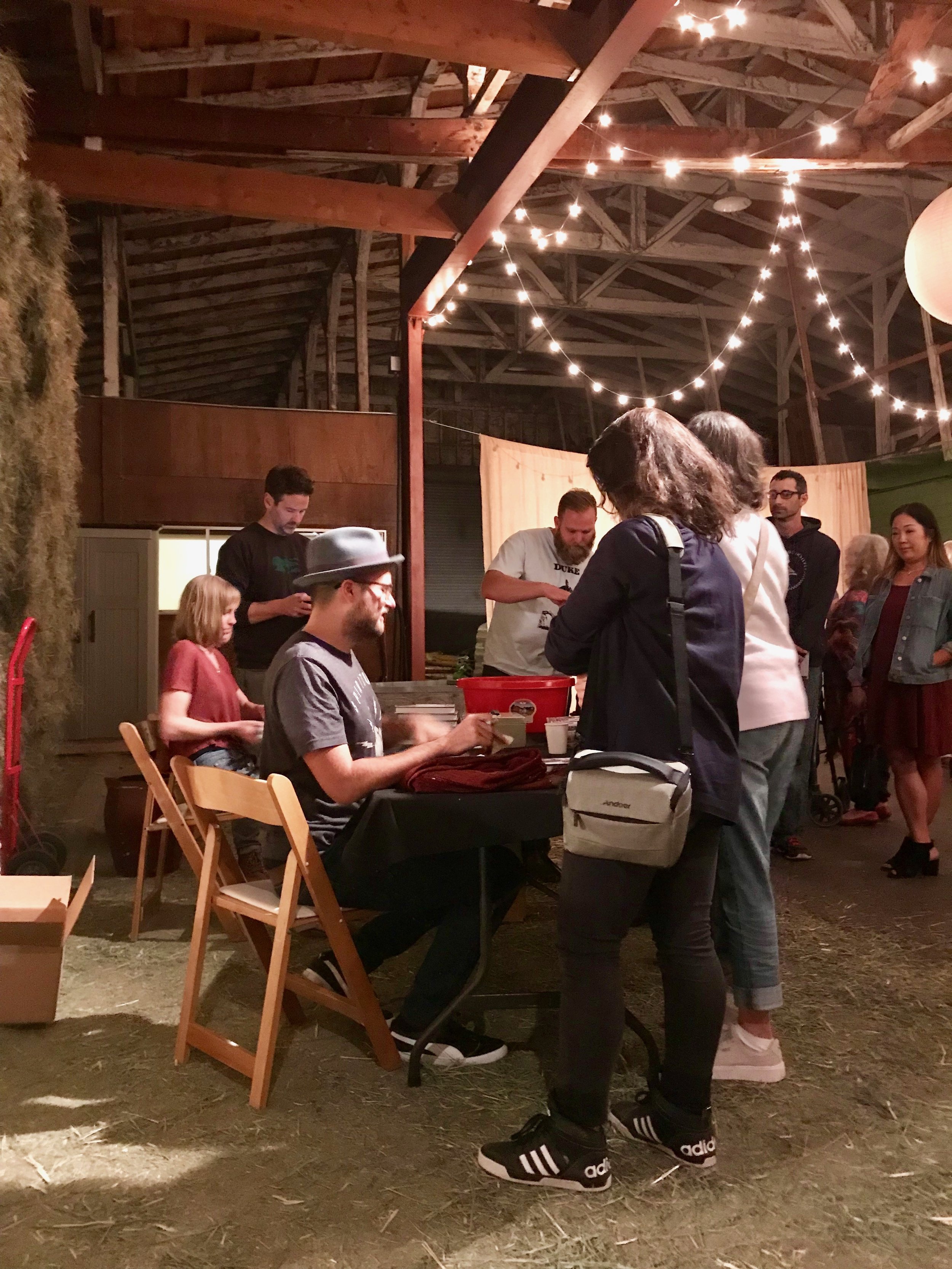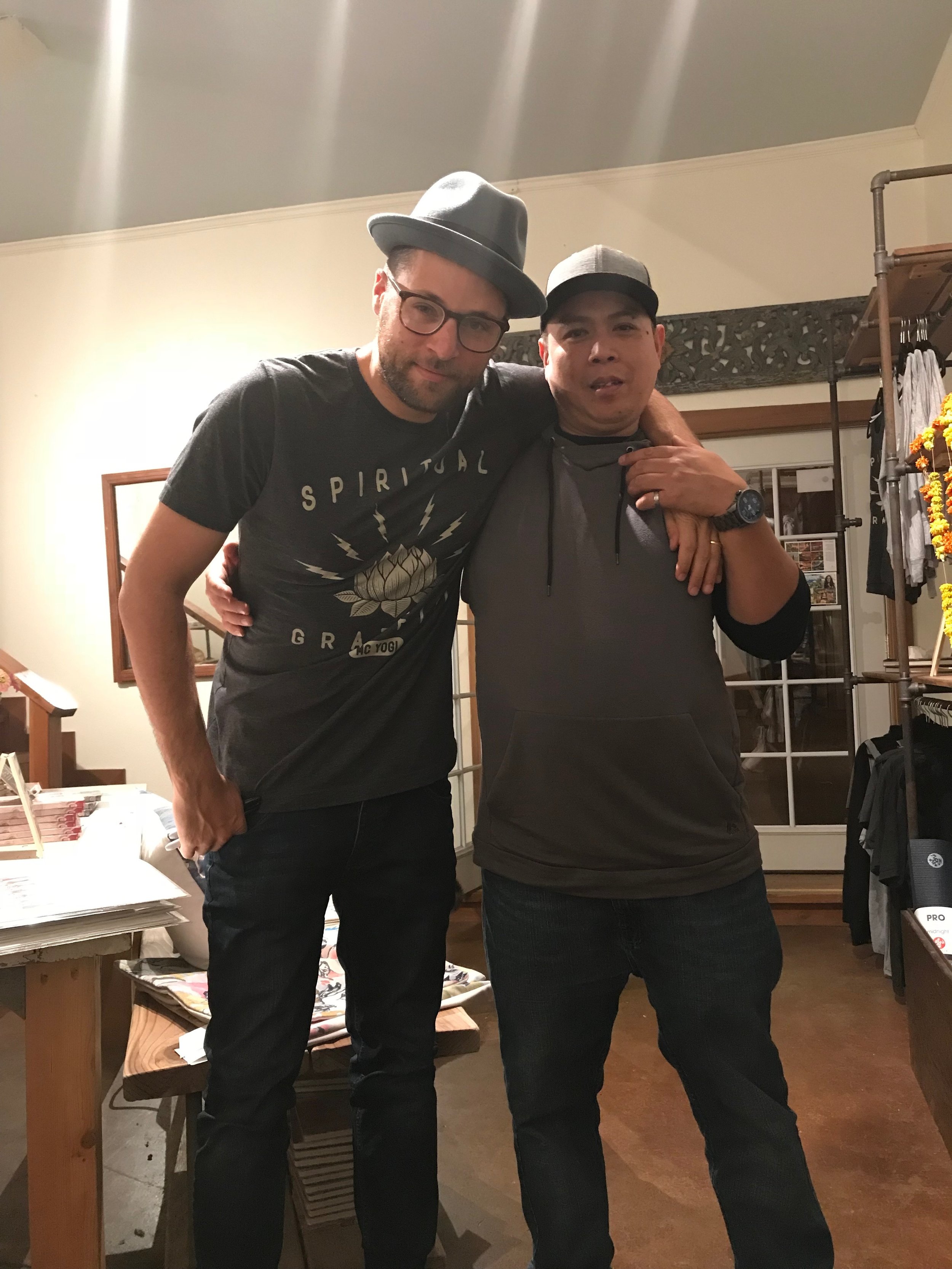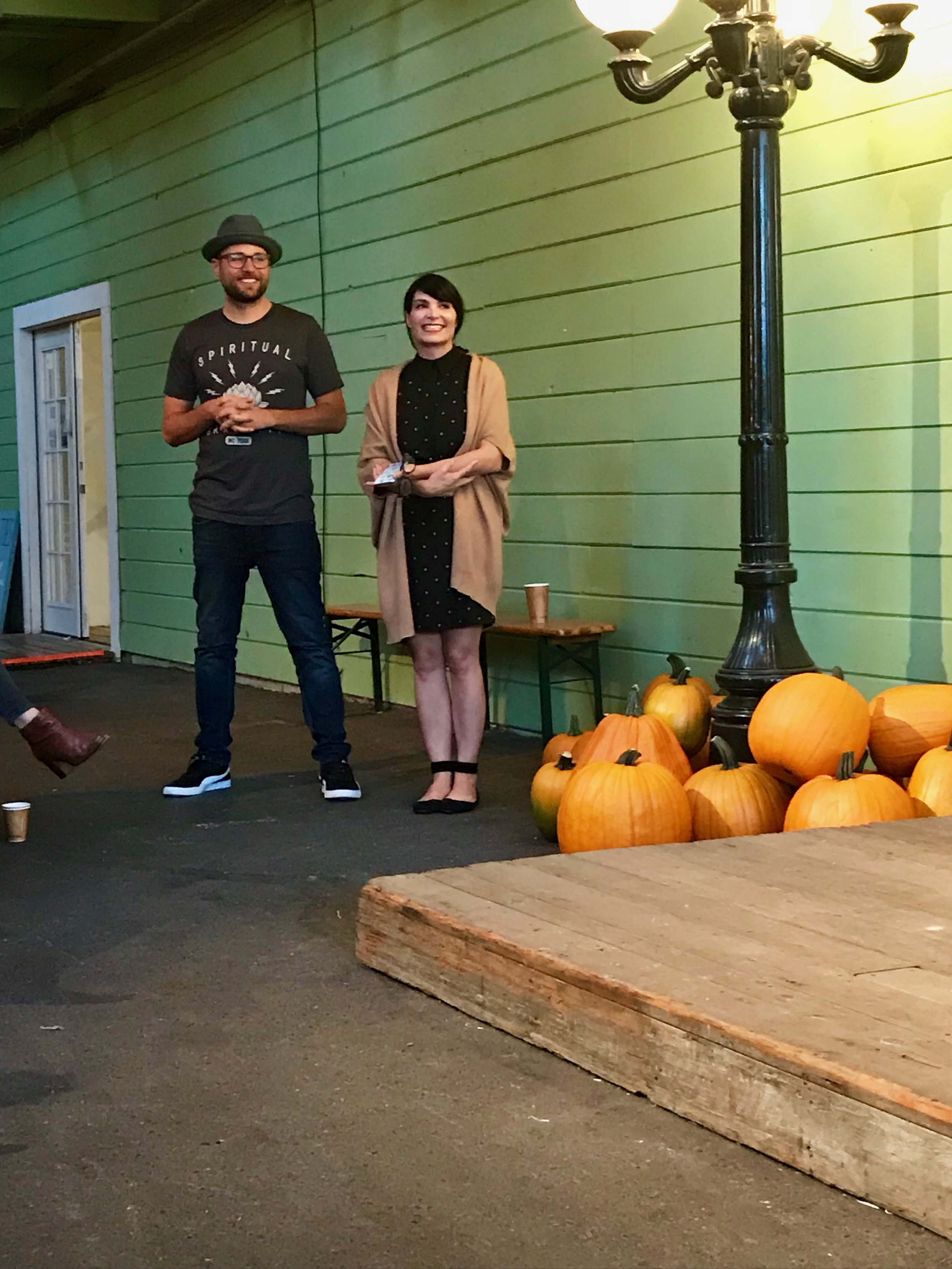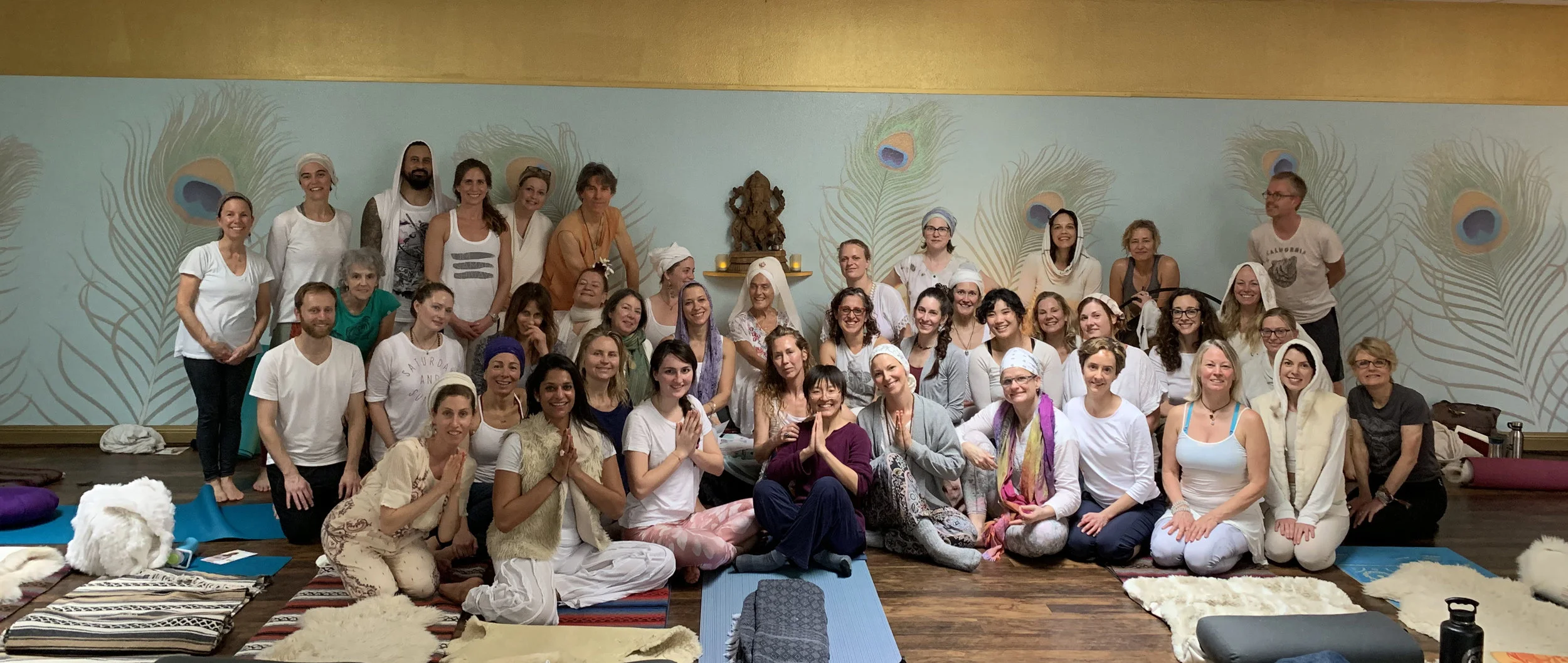Interview With MC YOGI!
By Nikita Mehta
“How cool is it instead of being at Barnes and Noble to be in this Noble Barn?” – MC YOGI
For all of you who couldn’t make it out to MC YOGI's book release party last Saturday at Toby’s Feed Barn, SF Yoga Mag went for you! We even stayed late, danced with Amanda’s mom and sat down with MC for a mini interview. So instead of gabbing about how cool the event was (it was super awesome and the space is amazing), we transcribed some back and forth between Amanda and MC and some interview questions that we had for the yogi superstar. For maximum reading pleasure, light some incense, throw on the original EP and get ready for MC to drop the beat (which he did at the show by spittin some of his yet to be recorded new song ‘Angels all around us’.)
“Stick with me and I’ll keep you young, and we will move to the country.”- Amanda (on how MC stole her heart)
MC: I wrote this book not because I wanted to, or planned on it, but because I was asked to write it. I was planning on recording another record, making another album. I had done the podcast and one of the people from the publishing house Harper One called us in and the rest is history. I wrote this book not just with the intention of sharing my story but sharing the story of my teachers and the people who made it possible for me to be who I am today. If I were to flash back to 20 years ago it was a very different scenario. I was living in a group home, I had gotten kicked out of every school I had attended, I was getting straight F’s, you know drugs and caught in violence with my friends. Good friends, good people, but you know we were caught in a downward spiral so to speak. And it was thanks to a couple key people in my life. One of them I would be remiss not to mention is Christian Giacomini, my father. He was my first yoga teacher.”
From Amanda’s mother: Why didn’t you use your name in the book?
MC: [This story is about being] able to go through that cycle all the way through till the sun breaks through the clouds and there is light again. And so, it would be weird to just kinda be self-promotional and just tell my story and make it all about me, so hopefully if I do my job right and I’ve written this book well, then it’s not just about me but it’s about everybody’s journey from darkness to light. And I didn’t use my name because, honestly, I wasn’t going to Point Reyes or Toby’s in there.
Audience: What recommendation would you give to parents on how to set their children on a good path?
MC: Example, example, example. Don’t preach what you are not embodying. It’s better to embody something and not talk about it than to preach something that you are not fully established in. And if you are worried about someone else, you are not doing what you should be doing to show up and be fully present, then it’s kind of contributing to the problem. So, human being we are really really good at projecting. In fact, we were going to have a projector here tonight and we were like ‘no, too much projecting’. So, it’s easy for me to say that, but it really is a lifelong practice. Like if you want someone to calm down, you don’t say ‘CALM DOWN’, you know. You’re saying one thing but you are communicating another thing. So, it’s real easy nowadays with what’s going on in the political climate and the environmental climate, it’s very easy to go to anger and upset and stress and turmoil. And I think it takes a real strength to, a real muscle, to be able to be kind, and strong, and patient and compassionate. I really credit this community, not just the community but also the hills and the trees. And I feel like the more time that we can spend with nature, the more we get to know our own nature. Larry use to always say this: I practice yoga so that I am less miserable to be around. I don’t like to give advice, but my suggestion is, if you really want to see someone else do something, then do that. And just model it. Because people are way more smart than you think they are. And we are all extremely sensitive, I think we are all psychic.
Amanda: I think we were both very lucky to have teachers who did lead by example. Larry was also my teacher and we shared the same Pattabi Jois in India and a meditation teacher. And a question that we often get it, ‘how do you find your teacher?’ Especially in the world of Indian gurus and even in America there is this rise and fall of teachers. Teachers get elevated and revered and there are horrible scandals that come out and they have been abusing their power, and how do you navigate where you can get the teaching and knowing where you can trust.
SF Yoga: How do you navigate that whole relationship of finding a good teacher?
MC: One of the yogic texts, the Uddhava Gita, not a lot of people know this but right down the street from here in Olema is the largest Hindu retreat center in the world. And that’s the Vedanta society. It’s a meditation retreat center, they have a center in San Francisco, and you can go meet with the swami and stay there. And for many years, I would go there and sit with Swami Prabhavananda, who has now passed away, and we would read from this scripture. And one of the teachings it said, be like a bee, and gather pollen from all directions, and then bring it back and develop it, inside yourself, and you’ll turn it into nectar. But be careful not to just go to one thing, because that creates some co-dependency and some attachment, and I think I was really fortunate because I had a lot of different teachers… but really to progress and evolve you have to essentially become your own teacher. And I think if you are involved in that process of gathering wisdom and teachings, then people will start to appear in your life when they need to appear. But you have to be involved in the process. Because I don’t think that someone just shows up unless there is some part of you that is really ready.
Amanda: I also think that book is really great, like if you haven’t come across a human teacher who you really connect with, luckily a lot of amazing teachers have, probably that’s the best way to get it because then you’re not getting all entangled in their personal stuff, but you just get the teachings. And that’s one of the great things; you know they say, spend time with the wise. Spend time with knowledgeable, and books are a great way to do that.
SF Yoga: We just had the amazing opportunity to talk with Simrit, and we spoke to her about how yoga has evolved in the past few years. Where do you think the future of yoga is headed?
MC: I think the intelligence of yoga is very brilliant, because it seeps into wherever there is a crack. It will find its way. So that gives me a lot of hope. Yesterday I was in juvenile hall and you see yoga with veterans, in hospital and schools. The real practice of being mindful and being present, breathing, connection, being reverent, being of service, I think those practices are really taking root in America, but on top there is a lot of frivolous stuff on the surface. You have to wade through it and sift through it to get to the real practice, and that comes with time. But it has changed a lot. For better and for worse.
SF Yoga: Do you think we run the risk of pulling at the strings of the traditional practice that yoga unravels and becomes something foreign to the essence?
MC: I think right now yoga runs the risk of disconnecting to its root system and anytime something disconnects from its roots it kind of withers and dies, it loses connection to the source. And for me the roots of yoga really run deep in India, and I think if you discredit India and all the thousands of years of sages and mystics that have carried the tradition forward, if you are ignorant of that and you take it off in another direction, you can spiral out of control with it. You have two sides, you have tradition and progress. But progress without tradition can be really ungrounded, and tradition without progress can be really stagnant. So there needs to be a balance between the two, masculine and feminine, past and future, and yoga is all about finding that equilibrium in the middle of those two extremes. Because I think the pendulum also swings towards traditionalists, and if you are too dogmatic and not leaving room for innovation and evolution, then traditions die, they are not living.
SF Yoga: Your grandfather built this barn that we are sitting in, and then your father created the yoga space where you and your wife now teach classes. You have three generations within these walls. What is the legacy that you want to etch into this space?
MC: My grandfather and my father have always been very heavily into service, always doing things for the community, benefits and events. Things that we wouldn’t even know about, you know, people would come up to us and say ‘your dad helped us’ or ‘your grandfather helped us’, so I grew up watching them and learning how important it is to be connected to community and be a good friend.
You can order your copy of Spiritual Graffiti here. To learn more about MC YOGI visit mcyogi.com and to learn more about Amanda visit 10000buddhas.com.













